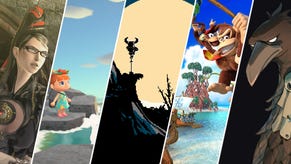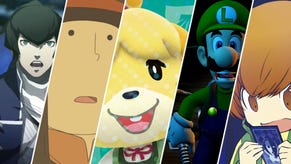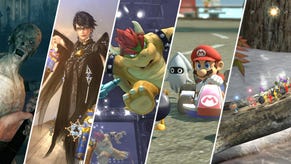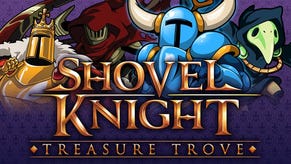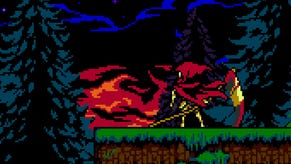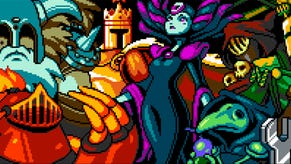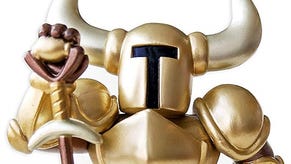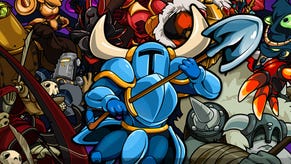Inside Shovel Knight: A Look at a First-Time Developer's Big Week
We joined Yacht Club Games for the final whirlwind days before the launch of Shovel Knight. Here's what we learned.
This article first appeared on USgamer, a partner publication of VG247. Some content, such as this article, has been migrated to VG247 for posterity after USgamer's closure - but it has not been edited or further vetted by the VG247 team.
This piece originally ran shortly after the release of Shovel Knight on the Nintendo Wii U and 3DS. With Shovel Knight launching yesterday on Sony's platforms, here is an inside look at the chaotic week leading up to its original launch.
Their first title launches in two days, and the office of Yacht Club Games is tense. Nearly 8pm, and programmer Ian Flood and artist Nick Wozniak are slumped in their chairs, bags under their eyes, and looking at their screen and frowning.
"I don’t know what to do," exclaims Flood. That's not what you want to hear from half of your programming team. Flood, who resembles Peep Show’s David Mitchell, holds a controller in his hands and then does something unexpected: he begins to laugh.
He and Wozniak aren't working on Shovel Knight, their widely-anticipated 8-bit-style platformer. Instead, two days before launch, they’re playing Solar Jetman on a Nintendo emulator, streaming their play sessions to their fans—just as they have for the past year. While you'd expect Flood and Wozniak to be frantically working on bugs, e-mailing publishers, or doing one of a thousand other tasks required before their game can launch—instead, they have returned to what brought them to where they are: a love of retro video games.
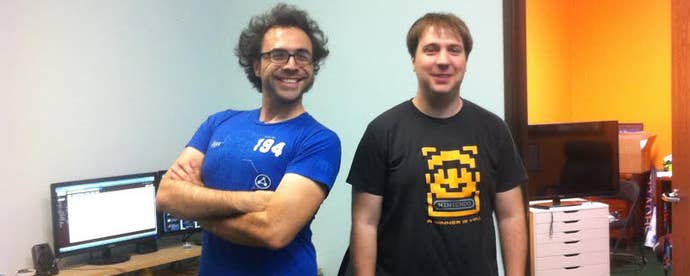
Humble Accommodations
During the lead up to Shovel Knight's launch, Yacht Club Games was kind enough to open their Valencia, California office to me. Nestled in a non-descript corporate park, there isn't much around here other than mountains, glinting windows of office buildings, and the occasional rest stop restaurant.
When I open the door, I expect a receptionist. Instead, I stumble upon the entire operation. Four computers, five desks, all in the same green-carpeted room. The team looks at me as if I've stumbled upon their secret drug ring. I introduce myself and assure them that I am here in good faith. They assure me they haven’t seen too many outsiders the last few weeks. Given that this is their launch week, I nod in understanding.
Since their Kickstarter page went live in March of 2013, Yacht Club Games has been the standard bearer both for the Kickstarter game community and the retro game movement. But Yacht Club Games is essentially four people in an office and one computer monitor constantly projecting the face of the fifth (David D'Angelo, who telecommutes from Chicago). Nick "Woz" Wozniak is the resident pixel artist and he greets me while wearing a Dr. Horrible t-shirt. He studied animation in college, and cites Metal Slug 3 and Demon Souls as being big influences on him. He sits next to Ian Flood, a Jersey transplant and half of the programming team at Yacht Club. Flood also handles the Twitter account, and confesses that no one had Twitter accounts until this game's development cycle. Flood is busy with handling the social media push for the game as well as pushing live a patch to fix a late-discovered bug involving one of the game's bosses.
Across from Ian is director Sean Velasco, arguably the most gregarious of the team, whose oddball humor you can see fingerprints on certain aspects of the game. A Southern Californian native, he cites Disney's "Golden Age" of animated films as a huge influence on his work. Finally, there's Erin Pellon, whose stunning art and calm demeanor hide a ferocious passion for games. She grew up watching Toonami, Cartoon Network's anime programming block, and playing games—she recalls how she used to calculate her allowance by the number of batteries she could buy for her Gameboy.

Review in Brief: Shovel Knight
"I've played plenty of retro remakes in the past five years, but very few have been as good as Shovel Knight. I would have to go back to 2008's Mega Man 9 to find a retro platformer that captures the spirit of the genre as well as this game. In some ways, I would even argue that Yacht Club's effort is even better."
"Despite appearances, Shovel Knight is a platformer that is as willing to look forward as it is to look back. As we've covered in our Game Dev Recipes piece from a while back, Shovel Knight borrows a variety of concepts from games past. Its got Castlevania's items; Mega Man's themed stages and bosses, and Zelda II's attack mechanics. But its smart enough to play around with the genre's conventions a bit as well, and the result is a game that feels surprisingly modern." Read the full review here. -- Kat Bailey
On their Kickstarter page, the company proclaims their love for 8-bit titles like Zelda 2 and Mega Man. This genuine love for a bygone gaming era is one of the first things you'll notice about them. Tired as he is, Velasco eyes still light up when he talks about Zelda 2. "I only beat it when I was 25," he readily admits. And he can easily pinpoint to you where he got stuck but why he still loves it. Meanwhile programmer Ian Flood recalls his love for Nintendo bordered on unhealthy as a child. He once hit his brother with a booster seat and yelled "power block!" in reference to Mario.
As their Kickstarter success has proven, it seems they were not alone in their nostalgic fandom: Hoping for a target of $75,000, backers instead pledged over $330,000 through Kickstarter and Paypal. Their demo at PAX East in April of that year cemented their "rising star" status, and no one was more surprised by the team’s success than themselves.
Though Shovel Knight is Yacht Club Games first title, they aren't fresh faces on the gaming scene. All five team members worked together at Wayforward Games, a Los Angeles-based game studio most known for its licensed games. As part of WayForward, the five team members of Yacht Club made contributions to A Boy and His Blob, Contra 4, BloodRayne Betrayal, Mighty Milky Way, and Double Dragon Neon. Velasco describes Yacht Club Games as the "core team" behind Double Dragon Neon.
After working with each other on Neon, programmers Ian Flood and David D'Angelo, and artists Nick Wozniak and Erin Pellon decided they wanted to strike out on their own. The departure from WayForward was quite amiable from the team’s perspective, Flood contends the team holds "no ill will towards WayForward."
"This was just much more exciting," he says.
The first project for Yacht Club Games was actually going to be a iOS game. But both Wozniak and Velasco concede that the project wasn't the game they wanted to make. So they dropped it and began focusing their attention on the project that eventually became Shovel Knight.
The first question that everyone asks the Yacht Club Games team is: "Why the shovel?" That usually elicits groans and rolled eyes from Wozniak and Velasco, who handle many of the interviews. They're seasoned-interviewees at this point, and while everyone expects the original of Shovel Knight to be part of a funny story, the origins of the shovel lie not in the aesthetic decision for an unorthodox weapon, but because the team had a game mechanic in mind that they wanted to build from. The mechanic? Link’s iconic downward stab attack from Zelda 2. From there, everything grew out. The team eventually decided upon a shovel in December 2012.
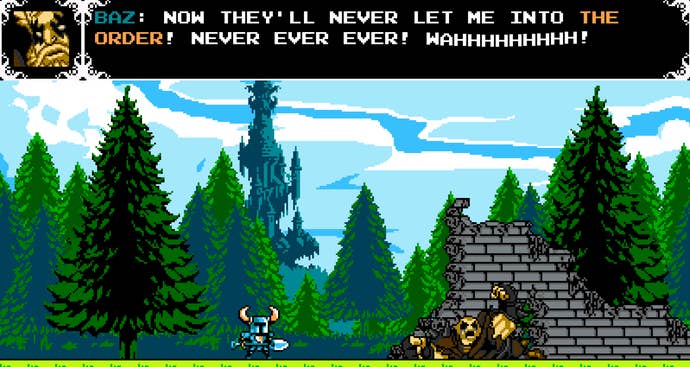
Kickstarted
While the Shovel Knight project has become a new standard for which all other Kickstarter-backed games can aspire, funding through Kickstarter was not the initial choice for Yacht Club Games. "We thought about venture capital [funding] and getting a publisher," explains Wozniak. And while Wozniak credits Kickstarter with being the biggest aspect that made the game a "real" thing, there were also some drawbacks.
"Kickstarter is really good at creating a 30 day hype cycle," he explains. Fans see your project, the potential in it, and it's in their best interest to promote the project they invest in so that it actually gets made. Shovel Knight became a nearly-overnight sensation because it tapped into a community of like-minded retro game lovers, and they showed this love by exceeding the funding goals the project had. "[Kickstarter] is a great way to directly interact with fans… it's a cause that people can fight for," Wozniak explains. "You have this mentality of being part of a campaign."
But there's a drawback as well. "You dont want to overpromise," Wozniak warns. Everything developers promise their backers they'll eventually have to make good on, and for small teams or young developers, that can be a thorny (and exhausting) issue.
During my time at Yacht Club Games, I got to see some of the blowback first hand. E-mails came in on an hourly basis regarding who got what earlier, with the soundtrack and early access to the game itself being hot topics. "Backers are fickle," Velasco laughs. "'Reviewers got it first? That’s not fair!'" But the team understands where the backers are coming from. Flood concedes there's a higher level of expectation if you back something, that you should get something first or the "best" version of the game.
"[Kickstarter] is a great way to directly interact with fans… it's a cause that people can fight for. You have this mentality of being part of a campaign." - Nick Wozniak
On the other hand, Yacht Club is a small team, and they've taken on a great deal for their first project. "You're making promises that you intend to keep but can't," Wozniak admits. "Suddenly, a promise you made six months ago is messing up your game." Yacht Club Games sought to deliver on not only the initial game but many "stretch" goals like a gender swap mode, a campaign where you play as a knight from the Order of No Quarter, and a Challenge mode. As of launch, these elements are still in development, though the team is confident they will be live soon.
"This is the 1.0 version of Shovel Knight," Velasco explains. "All of the stretch goals will become available, for free of course." Though development for the stretch goals is still in its planning stages, localization for territories outside North America and Mac and Linux ports are on the agenda. The plan is for players to play the game for a few months and then the DLC will come out and hopefully recapture the enthusiasm of players. Velasco cites Blizzard as a company whose dedicated to fans they want to emulate: "Diablo 2 felt like it updated for 10 years. I know Blizzard will take care of me...they swallowed their pride on the [Diablo 3] auction house. But it shows how dedicated they are to their people. That's what I want to be."
Overall, Yacht Club Games' impressions of Kickstarter are overwhelmingly positive. "It's invaluable to get your project off the ground," states Wozniak. If you're an independent developer, Kickstarter is a viable and sometimes your best chance to get your idea funded.
This has, to their mind, created necessary stratification for the industry. "Think about [the industry] 10 years ago," Velasco explains. "Pixel games were not represented and games all cost the same amount. But now, you have teams of two people who are making great games. Look at Faster Than Light." Artist Erin Pellon pauses from doing a piece of disc cover art to chime in, "I love FTL!"
"It's never been easier to make a game before, the only limitation at this point is your ability to learn," Wozniak explains, citing his own experience learning animation by pencil and paper and eventually move on to 3-D flash, and other aspects of art-- all of his pursuit of making video games. And unlike previous generations of making games, developers aren’t limited by publishers or console makers. "There aren’t the gatekeepers any more." So for developers like Wozniak, the ability to appeal directly to fans is unprecedented and essential.
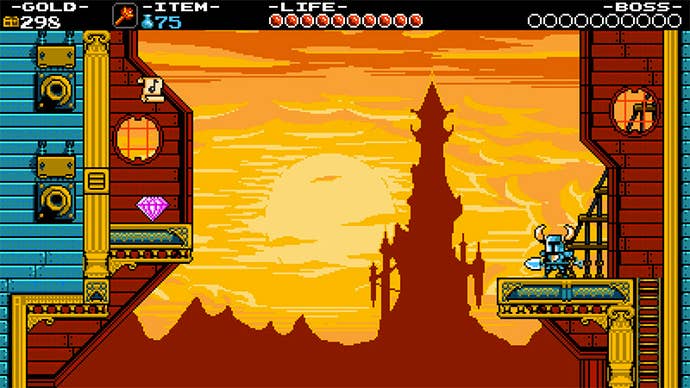
Growing Pains and Broken Deadlines
While Shovel Knight's reviews have thus far been glowing, success was never a sure thing. After launching the Kickstarter on March 14th 2013, they still didn't have anything they felt ready to show for PAX East in April.
"A week before PAX [East], we didn’t know if we were going to miss the show," admits Velasco. "If we didn’t have anything, we were just going to pull up bean bag chairs and play Mario 64 and have a sign that said: 'Shovel Knight: Coming Soon.'"
"Thankfully it came together really well," Flood says with relief.
But that was only a demo, and though Yacht Club Games' team now had the enviable position of a successful Kickstarter campaign boosted by positive buzz at PAX East, they were still in the very early stages of production. They didn’t even have an office. "For a while we were working out of my apartment," Velasco explains. "We pulled up chairs."
They moved into their current office in May of 2013, which is consisted of little more than three green-carpeted rooms without windows. Even so, they're not using all of the space. In practicality, the office is the main room, as the other two serve as nothing more than storage for Shovel Knight swag and another testing station. Four of the five team members sit at their desks and work. Only a Mega Man 9 poster decorates the white walls. While this may seem austere, the office never seems quiet. Ideas are picked up and tossed around the room, and everyone chimes in. Whether or not they should give a code to a 13 year old Youtube critic is batted around the office as easily as lunch orders. It's not hard to imagine design decisions to be equally communal.
"A week before PAX [East], we didn’t know if we were going to miss the show. If we didn’t have anything, we were just going to pull up bean bag chairs and play Mario 64 and have a sign that said: 'Shovel Knight: Coming Soon.'" - Sean Velasco
Velasco, with wild hair and black frames, is by no means the maestro of the team, but a lot of the stranger ideas in the game have been credited to him-- including the fishing pole game relic. He was also the main level designer, and Shovel Knight was built initially stage by stage. It took about two week to decide how big the project was going to be, and then the team began to work on multiple levels simultaneously. Velasco would design the levels while Pellon would make art concepts and Wozniak would make pixels. After everyone completed their work for a stage, it would go back again in a “loop.” Additionally, the team would have the occasional "design hangout." These ranged from things like weapon designs to entire stage themes.
Velasco recalls one meeting where they brainstormed the Tinker Knight stage. "It's going to be automated, so maybe drills? Maybe gears that roll out at you? From all of those ideas [we] narrowed down and informed our ideas." The team emphasizes the importance of compromise to their process. Velasco's philosophy seems to be: "Try it! Try it!"
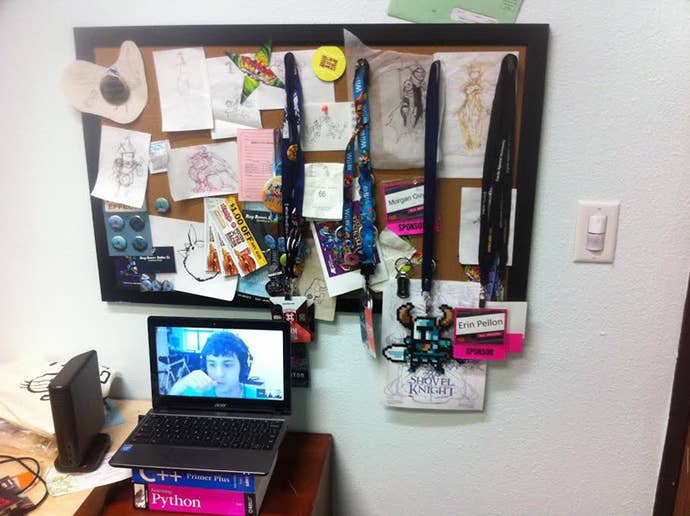
At one point, he thought it would be funny to have Shovel Knight go fishing. "I hated the fishing idea at first," D'Angelo admits. Initially, it was an aeshetic choice, a lark. "It serves no game purpose," Flood admitted. "But it was an idea that no one shut down, we could have cut it, but that's not how we do things."
Velasco goes further: "A lot of ideas are blended," and cites the sparkles that were added to certain pits that gave the fishing pole more of a purpose. The fishing pole ended up being useful, but it didn't start out that way. Flood explains that on every major design decision they let it "simmer" for a bit to figure out how it could work. "We've never put a design decision to vote."
The team hit alpha by the end of 2013. By then, they realized there was no way they'd be done with the project by March, so they'd miss their launch deadline. "We didn’t have a milestone cycle," Velasco concedes, "[which] explains some of the delays."
The lack of publisher oversight also likely played a factor in the game’s delay. Instead of having a deadline set by an outside force in which the game would be taken from them, Velasco explains that they had the opportunity to make the game even better, and they decided to take it. Shovel Knight hit beta by May of 2014, and a month later it was ready.
Not Done Digging
In the two days leading up to launch, one really appreciates how small a team Yacht Club Games really has. The team has a to-do list that is hundreds of items long that includes mailing promised merchandise to Kickstarter backers, ensuring reviewers and backers get access to the game, coordinating distributors prior to launch, and pushing a patch that corrects a bug they found, and oh yes, talking to the press. In a side room, they have packets of reddish dirt that they plan to stuff and mail as a thank you to some of their backers. They have a white board with increasingly frantic handwriting that gives calendars and to-do lists. They have another Skype interview at 3 and another at 5.
The team is, by their own admission, exhausted. More than one Yacht Club Games team member has complained about the effect the development cycle has had on their health. They have been working till late in the evening for months, maybe even a year. "You go to sleep for like 5 hours and there are like 50 new emails," Wozniak laments, as he is in charge of much of the social media management for the company. Though the website lists their jobs as simply "director" or "artist," all five of them have taken on numerous roles and in my time here I never saw anyone pull rank on another.
When asked about their social lives, they grunt and shrug, until someone points out that Nick Wozniak had a child. He smiles briefly, scratches his black beard, and turns back to his desk to send off another email. There's a picture of a newborn by his monitor, one of the few reminders of the outside world in the office. To Flood, Wozniak, Pellon, Velsco and D'Angelo, there really hasn't been an outside world for the last year. This is the first time they've ever worked on a project for over a year, and this one has surprised them with its amount of work: they stay late until they go home, where they will continue to work on their personal to-do lists for Shovel Knight. And they had help, too. Jake Kaufman did the sound (with famed Mega Man composer Manami Matsumae collaborating), intern Morgan Guyer helped with tilesets, animations and dozens of other tasks, and Mike Herbster (of WayForward) helped with some of the level design.
Despite the pressure on the company to perform and ensure a smooth launch from a technical perspective, the team has actually revved up its media presence in the days preceding the game’s launch. Most of the big items on Nick Wozniak's calendar are interviews with games press. All of these are handled amiably and by as many team members as are on hand, with Flood or Velasco jumping onto video calls when they feel compelled. Then there's their evening Twitch streaming retro gaming sessions, usually hosted by Wozniak and Flood. The team even takes time to share when someone has found something about their game online. Work stopped when Gamespot streamed their Shovel Knight play session. The team gathered around artist Erin Pellon's monitor, transfixed bit with child-like smiles, as the journalists played the first levels of the game.
It's the unity of an entire brand that is working towards one thing. That's what they hoped to capture with Shovel Knight: a united brand with classic gameplay, art, retail box, maybe even toys someday. "We made a character game. They don’t really make those anymore. The character is the name of the game. They don't do it anymore. That’s what Shovel Knight's mystique is. - Sean Velasco
With only a few hours to go before launch, programmer Ian Flood and pixel artist Nick Wozniak pull up the same chairs they've been working at all day to play a game. You'd expect the developers to be frantically working on bugs, e-mailing publishers, or doing one of a thousand other tasks required before their game can launch, but they have returned to what brought them to where they are: a love of retro video games. As they have throughout their development cycle, Yacht Club Games' team does a live Twitch stream of classic NES and SNES games. Initially, they thought about playing games that influenced Shovel Knight, games like Castlevania, Zelda 2, and Mega Man. "But instead, we decided to play some oddball games," Flood says with a laugh. "So we end up with Drakken."
Even playing these "oddball" games from the NES and SNES era has been fruitful and informative to them. It reminds them of why they're doing this in the first place: the honesty and simplicity of these games. "It's the unity of an entire brand that is working towards one thing," Velasco says. That's what they hoped to capture with Shovel Knight: a united brand with classic gameplay, art, retail box, maybe even toys someday. "We made a character game. They don’t really make those anymore. The character is the name of the game. They don't do it anymore. That’s what Shovel Knight's mystique is."
There's a point in Shovel Knight where you see the game's bones. You see the structure, the hereditary traits that make it what it is. Maybe it's the soundtrack, whose chiptune beats seem familiar. Or maybe it's the level design, recalling both Mega Man and DuckTales. Or maybe it's the literal package-- a box that is made to look like the iconic NES boxes of old—right down to the font and art style. Whatever moment it is, there's a flash of recognition, of appreciation for something long lost and buried—something between challenge and comfort, a spot where a game hasn't taken you in years. You're suddenly back in whatever shoes you wore when it was 1989 and you first picked up a platformer.
That's the beauty of Shovel Knight, and it's captured so well because Yacht Club Games clearly had those moments, lived those moments, and were inspired to make a love letter to retro gaming.


